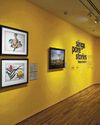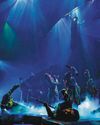
It might seem almost naive to gripe about the surge of negative campaigning and outright nasty rhetoric sweeping through the United States in these final days of the presidential race.
But the reality is attack ads and mudslinging have long been woven into the fabric of US politics, intensifying with each election - a trend well under way even before Donald Trump's 2016 run took campaign trail debasement to new lows. And this isn't just a casual outsider's view; research backs it up.
Political scientists Kyle Mattes and David P. Redlawsk, in their 2015 book The Positive Case For Negative Campaigning, mapped out decades of this adversarial shift. Back in 1960, only 10 per cent of presidential campaign messaging was "negative" - that is, focused on attacking an opponent rather than highlighting a candidate's own positions. By 2008, in the race between Mr Barack Obama and Mr John McCain, that figure had shot up to 60 per cent - a telling sign of how American elections have grown more combative.
A more recent book, Political Advertising In The United States, by Erika Franklin Fowler, Michael M. Franz and Travis N. Ridout, directors of the Wesleyan Media Project (widely regarded as the gold standard in US political ad tracking), confirms this trajectory: Negative and "contrast" messaging now dominate campaigns across both parties.
So, in this final stretch between Republican candidate Trump and Democratic nominee Kamala Harris, a descent into fierce negative campaigning was all but inevitable. Political strategists note that, as election day looms, attacks are often more effective than positive messages at energising supporters and unsettling opponents.
This story is from the November 01, 2024 edition of The Straits Times.
Start your 7-day Magzter GOLD free trial to access thousands of curated premium stories, and 9,000+ magazines and newspapers.
Already a subscriber ? Sign In
This story is from the November 01, 2024 edition of The Straits Times.
Start your 7-day Magzter GOLD free trial to access thousands of curated premium stories, and 9,000+ magazines and newspapers.
Already a subscriber? Sign In

Don't cross Culinary Class Wars star Anh Sung-jae of three-Michelin-starred Mosu
On an early episode of Netflix's hit reality cooking show Culinary Class Wars (2024), chef Anh Sung-jae stood in a warehouse filled with makeshift cooking stations and considered the plate in front of him: a rainbow palette of handmade pastas, purees and delicately cooked seafood. On top was a smattering of flower petals.

Emerald Hill to make Netflix debut
Emerald Hill looks set to be the must-watch local blockbuster series of 2025.

Refreshed museums in SG60 arts
A timely slate of refreshed spaces and new programmes at Singapore's arts and cultural institutions will be launched in 2025, wooing audiences with a different Singapore story as the nation gears up to mark 60 years of independence.

Going casual to woo fickle diners
Serious artwork on the wall. Bespoke crockery on cloth-covered tables. A fine wine list. Eye-watering menu prices. Just don't call it a fine-dining restaurant.

Smartwatches Make Healthcare Smarter
From tracking heart rate to steps taken to sleep quality, smartwatches and fitness trackers can generate biometric data about the people using them.

Quality, not quantity, rules the superhero game
In 2025, the big studios are rolling up their sleeves to tackle a disease plaguing the box office – superhero fatigue.

Big-name musicals to hit the stage
Soothing melodies and soaring high notes are set to fill the air, as the coming year brings along a host of musicals to the Lion City.

Celebrating design with SG60, new hotels and theme parks
Architecture and urban design take centre stage in 2025, with marquee events such as a year-long celebration of Singapore's 60th year of independence (SG60) and launches of Sentosa attractions to enhance the destination's \"islander allure\".

Travel prices likely to remain high
Low-cost carriers (LCCs) - once known solely for their no-frills, short-haul offerings - have been going through a route awakening.

More will work from the office, but hybrid is here to stay
2025 marks five years since Covid-19 shattered entrenched beliefs about the nature of work.